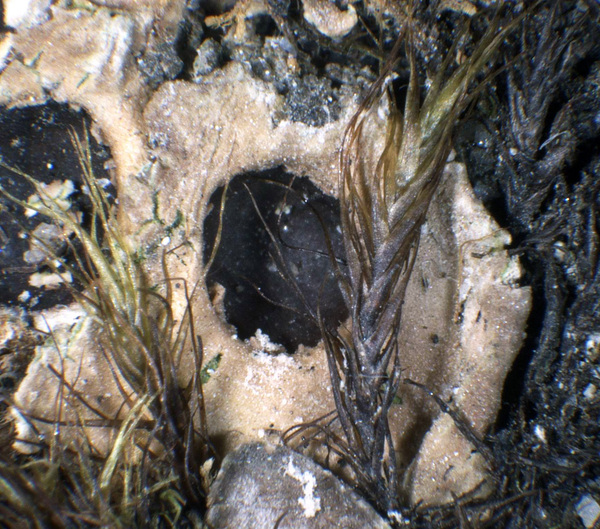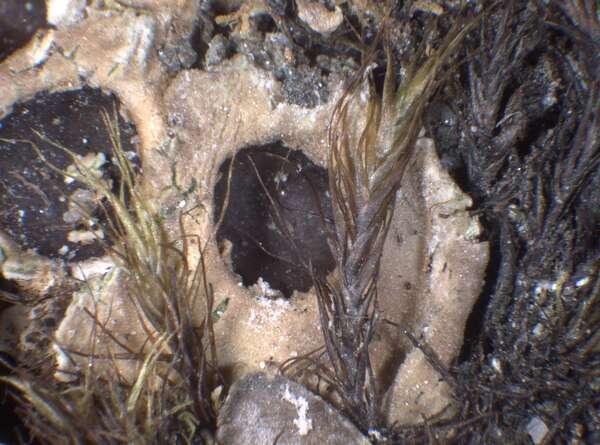Solorina bispora subsp. macrospora (Harm.) Burgaz & I. Martínez
in Martínez & Burgaz, Ann. Bot. Fenn. 35, 2: 140, 1998.. Basionym: Solorina macrospora Harm. - Lich. de France, 4: 661, 1910 (1909).
Synonyms: Solorina bispora var. macrospora (Harm.) H. Olivier
Description: Thallus small-foliose to subsquamulose, heteromerous, dorsiventral, 5-10 mm wide. Lobes rounded or irregular, flattened, smooth, poorly developed and sometimes reduced to a collar around the apothecia, the upper surface pale greyish-green, sometimes tinged brown, often white-pruinose, bright green when wet, the lower surface white, indistinctly veined, tomentose, with scattered, pale rhizines. Upper cortex paraplectenchymatous, lower cortex absent; medulla white, rarely hosting internal cephalodia. Apothecia frequent, usually 1 per lobe, semi-immersed, 2-5 mm across, with a brown to brown-black, concave disc, without a thalline margin. Proper exciple poorly developed; epithecium brownish; hymenium and hypothecium colourless; paraphyses coherent, not anastomosing, simple, the apical cells hardly swollen. Asci 2-spored, clavate, fissitunicate, the apex of the endoascus with a K/I+ blue ring-shaped structure, Peltigera-type, Ascospores 1-septate, constricted at septum, dark brown, ellipsoid to broadly fusiform, 95-145 x 45-60 μm, with a thick, reticulately ornamented wall. Photobiont chlorococcoid (Coccomyxa), with Nostoc in the internal cephalodia. Spot tests: upper cortex and medulla K-, C-, KC-, P-, UV-. Chemistry: without lichen substances.
Growth form: Foliose, broad lobed
Substrata: soil, terricolous mosses, and plant debris
Photobiont: green algae other than Trentepohlia
Reproductive strategy: mainly sexual
Commonnes-rarity: (info)
Alpine belt: rare
Subalpine belt: very rare
Montane belt: absent
Dry submediterranean belt: absent
Humid submediterranean belt: absent
Padanian area: absent
pH of the substrata:
1 2 3 4 5
Solar irradiation:
1 2 3 4 5
Aridity:
1 2 3 4 5
Eutrophication:
1 2 3 4 5
Poleotolerance:
0 1 2 3
Altitudinal distribution:
1 2 3 4 5 6
Rarity
absent
extremely rare
very rare
rare
rather rare
rather common
common
very common
extremely common
Loading data...
Occurrence data
Predictive map
Growth form: Foliose, broad lobed
Substrata: soil, terricolous mosses, and plant debris
Photobiont: green algae other than Trentepohlia
Reproductive strategy: mainly sexual
Commonnes-rarity: (info)
Alpine belt: rare
Subalpine belt: very rare
Montane belt: absent
Dry submediterranean belt: absent
Humid submediterranean belt: absent
Padanian area: absent
pH of the substrata:
| 1 | 2 | 3 | 4 | 5 |
Solar irradiation:
| 1 | 2 | 3 | 4 | 5 |
Aridity:
| 1 | 2 | 3 | 4 | 5 |
Eutrophication:
| 1 | 2 | 3 | 4 | 5 |
Poleotolerance:
| 0 | 1 | 2 | 3 |
Altitudinal distribution:
| 1 | 2 | 3 | 4 | 5 | 6 |
Rarity
absent
extremely rare
very rare
rare
rather rare
rather common
common
very common
extremely common
Loading data...
Occurrence data
Predictive map








